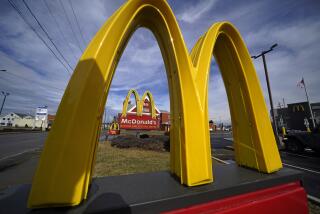McDonald’s launches campaign to answer pink slime, other rumors
McDonald’s Corp. is taking to social media to dispel rumors that its food is unhealthy and to explain why its burgers remain intact for weeks out in the open.
The fast-food chain launched a Q&A style advertising blitz on YouTube, Facebook and Twitter and its own website to answer questions from consumers about its food. As part of the campaign, the company has hired Grant Imahara, the former cohost of “Mythbusters,” to visit McDonald’s restaurants and suppliers around the country.
Kevin Newell, McDonald’s USA chief brand and strategy officer, said the chain knew “people have unanswered questions.”
“We look forward to the opportunity to have an open conversation and to show people firsthand how we make our most iconic menu items,” he said in a statement Monday.
The chain is taking a more hands-on approach to correct what it views as misconceptions about its food as the company struggles with declining same-store sales, a key measure of retail health. In September, McDonald’s reported its sharpest drop in global same-stores sales in more than a decade.
On the McDonald’s homepage, the chain had tried to directly address some of the most persistent rumors, videos and pictures that have circulated online regarding the quality of its food.
In response to experiments that show its burgers can stay intact for weeks or even years without rotting, the company explained that food that has been dehydrated cannot form mold and will simply dry out. “Sort of like bread left out on a counter overnight to make croutons for stuffing,” the company explained.
McDonald’s displayed less tolerance and more sass for some of the more outlandish myths about its food.
One question -- “Does McDonald’s beef contain worms” -- prompted this brief response: “No. Gross! End of story.”
Branding experts say the new strategy could either be a boon or a disaster for McDonald’s.
Engaging with diners who can turn their every meal into a Twitter or Facebook mini-review is crucial for corporations, but addressing negative misconceptions may actually fan the rumor mills even more, said David Johnson, chief executive of public relations and branding agency Strategic Vision.
“Some of these concerns they address -- a lot of people have never heard about or it was not at the forefront of their minds,” he said. “Now it may be.”
Johnson pointed to past social media flops by big corporations, including JPMorgan Chase’s question-and-answer session on Twitter last November. The event was quickly canceled after people jumped online to lash out against the bank with snarky quips and innuendo.
“That became a big story,” he said. “The potential for it to go wrong, for all the late-night comedians to make fun of it, is great.”
Follow Shan Li on Twitter @ShanLi
More to Read
Inside the business of entertainment
The Wide Shot brings you news, analysis and insights on everything from streaming wars to production — and what it all means for the future.
You may occasionally receive promotional content from the Los Angeles Times.











